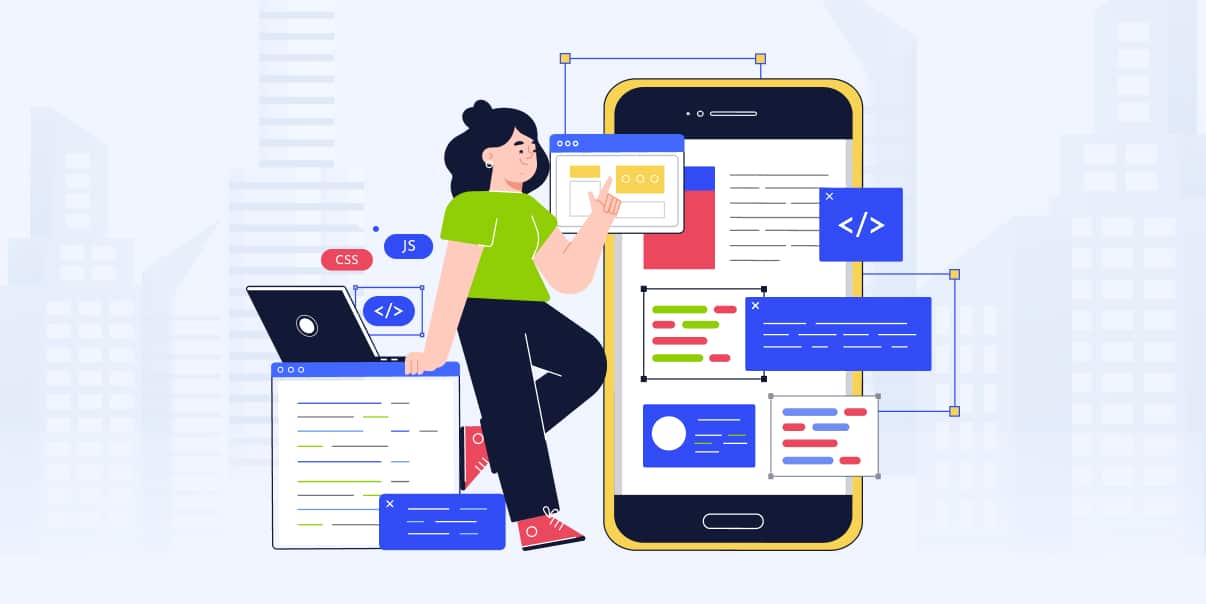Hybrid App Development: A Comprehensive Guide

Hybrid app development has become popular among businesses when creating mobile applications. It combines native app components and web-based technologies to build hybrid apps.
Hybrid apps are faster to deploy than native apps, saving time and money for businesses. If you want to create a hybrid app, this guide provides tips on making your project successful.
What Is Hybrid App Development?
Hybrid app development involves creating an app compatible with multiple platforms. It uses a framework that works on Android, iOS, and Windows platforms.
In hybrid app development, developers only need to write the code once and reuse it for other platforms. It ensures that your app works for different devices and offers features suited to each platform.
How Does Hybrid App Development Work?
Hybrid app development starts with the same basic steps as any other software development project. The phases include setting objectives, developing an interface, adding features, and testing.
Hybrid apps are built using web technologies such as HTML, CSS, and JavaScript. The code is typically written using a code editor such as Visual Studio Code or Atom. Once coded, the app is then wrapped in a native container that allows them to be installed and run on a mobile device.
Developers use various tools for testing. You can use either the framework’s built-in testing tools or third-party testing services. The development team then fixes any bugs or issues that are identified. After that, you can publish them on the App Store or Google Play Store.
Native vs. PWAs vs. Hybrid Apps: Understanding the Differences
Hybrid apps differ from native and web apps in several ways. Hybrid mobile apps use web-based technologies and native application components. In contrast, native apps are designed specifically for one platform.
Hybrid apps offer more cross-platform compatibility, while native apps are limited to one platform. PWA apps, on the other hand, are web-based applications that provide some of the features of native and Hybrid apps.
Hybrid apps offer an excellent balance between user experience and cost efficiency. They’re easier to develop than native apps and faster to launch faster, saving businesses time and money.
Best Examples of Hybrid Apps
Hybrid mobile app development is an excellent option for creating an app that works across different platforms. Here are some of the best hybrid app examples today:
- Instagram – This hybrid app provides users with a creative way to share photos and videos, no matter their platform.
- Discord – Discord is a hybrid application designed for communication and collaboration.
- Twitter – This popular social media platform is successful because of its intuitive user interface.
- Microsoft Teams – Microsoft Teams is known for its chat, video conferencing, file sharing, and more tools.
- Amazon – Amazon’s apps are written in web languages, like Java and HTML5, but run in WebViews.
- Netflix – This streaming app allows millions of viewers to watch videos and movies across different platforms.
Reasons for Adopting Hybrid App Development
Hybrid app development is becoming popular because it provides numerous advantages to businesses. It gives the ideal balance of cost-effectiveness and functionality in hybrid app development. Let’s look at the benefits it offers:
Ease of Development
Hybrid mobile apps are easier to build since developers don’t need to know the language of each platform. Hybrid app development languages revolve around web technologies. These languages include the triumvirate of HTML, CSS, and JavaScript.
Scalability
Hybrid apps employ a simple HTML language that is simple to maintain. Unlike native apps, there is no versioning in hybrid app development. When a new operating system is released, developers don’t need to create a new app version. Hybrid apps can function smoothly in the new operating system.
Performance
Regarding speed and performance, hybrid app development rivals native app development. Hybrid apps are, in fact, faster than progressive web apps. It is because there is no reliance on network communication. Also, hybrid apps with a more extensive user base perform better across all devices.
Cross-Framework Compatibility
By default, enterprise hybrid mobile apps work with multiple platforms. A single code base can support various operating systems. Hybrid apps, for example, can be installed on two devices running Android and iOS. This feature enables hybrid apps to reach a larger audience.
User Experience
Smooth user experience and appealing design are core features apps should have. This way, the hybrid app will provide a superior UI experience and flawless performance. It’s the best option for businesses wanting to attract both iOS and Android customers.
Shorter Time to Market
Writing code only once saves a significant amount of time. As a result, the development time is much shorter than that of a native app. Apps that generally take months to develop can be ready in weeks when employing the hybrid approach.
Cost Savings
Maintaining a single code base for different operating systems cuts down costs. The overall investment for the app decreases as the time required to build the app reduces. These cost savings are beneficial to small businesses.
Popular Frameworks and Tools Used in Hybrid App Development
Popular hybrid app development frameworks have their unique advantages and drawbacks. You need to understand their features to choose the best hybrid app framework.
React Native
This framework allows you to build hybrid mobile apps using only JavaScript. It enables you to create a rich mobile UI from declarative components.
You do not create a mobile web, HTML5, or hybrid app with this React Native. You create an actual app identical to those built in Java or Objective-C. React Native uses the same UI building blocks as iOS and Android apps. Then, you connect those building blocks with JavaScript and React.
PhoneGap/Cordova
PhoneGap is the new name for Apache Cordova. It’s a framework that helps create hybrid apps using web-development languages. These languages include HTML, CSS, and JScript. Developers don’t need expertise in various hybrid frameworks when developing an app. PhoneGap solves this problem using standards-based web technologies.
Xamarin is a Microsoft-owned software company based in San Francisco, California. Xamarin can build hybrid apps with native UIs and share them with other platforms. It saves you time by reusing abilities, tools, teams, and, most importantly, code.
Ionic
Ionic is a well-known framework and is the preferred choice of many developers. The framework’s CSS components are enough to create native-looking applications. Ionic’s command-line interface comes with integrated emulators and Cordova-based app packages.
It’s a smart framework that allows you to create compiled mobile apps from a single codebase. This framework was developed and released by Google. Flutter enables developers to build and deploy visually appealing mobile applications. Flutter is one of the few SDKs that provide reactive styles without JavaScript.
NativeScript
NativeScript is a free, open-source framework that lets you create cross-platform apps. You can develop an application with the same codebase and deploy it on multiple mobile platforms.
Adobe PhoneGap Build
PhoneGap builds hybrid apps using web technologies such as HTML, CSS, and JavaScript. It’s an open-source platform that enables developers to create hybrid Apps without requiring native coding.
Hybrid app development lets businesses provide their users with an optimal mobile experience. Hybrid apps offer the ideal balance between cost-effectiveness and functionality. Hence, hybrid apps provide a great user experience across different platforms.
Stages of Hybrid App Development
Once you have chosen your hybrid app framework, you can proceed with the actual development process. These are the phases in mobile app development that you need to understand.
Pre-Development
How many users with logging rights should the hybrid app have? What operating system do you want it to run on? What sizes of smartphone screens do you want to follow?
A well-designed evaluation process should include the following steps:
- Competitor research
- Mapping of features
- Technical needs
- Costs and deadlines
After you have decided on the app, the next step is to shape the first visuals of the hybrid app. You can sketch the app’s appearance or identify its critical features. A storyboard or a workflow chart gives you a visual picture of the app. The sketch is where the app’s essential functions appear in greater detail.
Development
After accomplishing the design, the next step is to turn the model into a functional product. The next stage of development is to start the actual development of the app. It’s when the programmers enter and code all of the necessary features.
During this phase, developers shape the prototypes to create the actual app. The development process has two segments: frontend design and backend integration. Frontend design connects to backend processes where data is stored.
Testing
Software testing usually goes hand in hand with app development. This stage is crucial because this is where developers identify and correct bugs and errors. The app must go through several tests and quality assurance guidelines before being ready for launch.
Deployment
After all the testing, your app should be ready for final launch. Set a date and begin the official rollout. You can publish the app in online mobile stores like App Store and Google Play Store.
Maintenance
The ultimate end of app development is maintenance and updating the app. You polish the app and improve it by adding advanced features from the project’s backlog.
You must be proactive and align user involvement with regular app updates. Incorporate feedback from users into your updates. This way, app development becomes a dynamic process.
Is Hybrid Mobile App Development Best for Your Business?
When considering hybrid app development, there are several factors to consider:
The Frameworks Your Hybrid App Will Run On
The three most popular mobile platforms are iOS, Android, and Windows. Each of these can offer various advantages for different brands targeting different audiences. Many hybrid app frameworks are available, and it can be challenging to choose the best. Consult your development team if you need help deciding which hybrid app framework fits your project.
The Features Your Hybrid App Will Have
Decide which features and functionalities you want to develop. You also need to find qualified developers with the skills to create these features. Consider their specialization in developing basic or more intricate applications. Prioritize developers with the know-how required to create features tailored to your needs.
The Timeframe for Development
Another thing you need to consider is your project timeline. Do you need the app as soon as possible? If so, hybrid development is more suitable because it has a faster development time. But if you want to create an app tailored to a specific platform, native app development is more practical.
The Cost
Knowing and allocating your budget is essential. The cost required to develop this type of technology depends on desired functionalities. Prioritizing what you need most can help shape how much comes out of your pocket. This strategy would pave the way for success and savvy financial decisions.
The Level of Customer Service
An app’s success depends on knowing your customers’ needs and preferences. Determining what value the app will bring is essential before beginning development. Otherwise, you risk investing in something that your users may not appreciate.
Wrapping Up
Hybrid apps are an excellent choice for businesses that want to reach a broad audience and create an app with a great user experience. Hybrid app development offers numerous benefits. But you must consider several factors before deciding. Think about the features your app will have, along with your budget and timeframe. It will allow you to develop an effective solution tailored to your needs.
Hybrid App Development FAQ
Does BIT Studios offer hybrid app development?
Yes, BIT Studios specializes in software solutions, including hybrid app development. We have a team of software development experts ready to deliver the best solutions for our clients. Contact us to learn more about how we can help you with your project.
Which is faster to build: native or hybrid apps?
Hybrid apps are generally faster to build than native applications as they require less development time. Hybrid apps can also run on multiple platforms, which can work for Android and iOS users. However, depending on the features needed, native app development may be more suitable for some projects.
How much does hybrid app development cost?
Hybrid app development costs vary depending on the features and functionalities needed. It is essential to consider your budget and prioritize what you need most when allocating resources for your project. Your budget will determine how much you need to spend to create the perfect hybrid app that meets users’ needs.
We’re BIT Studios!
At BIT Studios we specialize in designing, building, shipping, and scaling beautiful, usable products with blazing-fast efficiency



